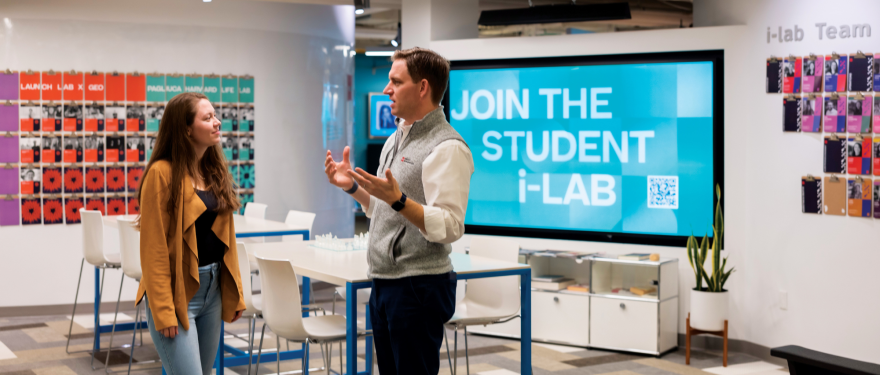The Harvard Innovation Labs ecosystem has been called a place of “structured serendipity” where innovation is fueled by connection and collaboration. The labs enable students and alumni from across Harvard’s 13 schools to take the seed of an idea with the potential to solve a problem or address an unmet need and grow it into a purposeful entity.
The i-lab, the original component of the now three-lab ecosystem, opened in 2011 in Batten Hall with the vision of offering a “One Harvard” learning and convening space where venture teams with at least one Harvard undergraduate or graduate founder could access the resources of innovation and entrepreneurship. These include a wide range of courses and programs; maker, media, and AR/VR studios; experienced mentors; and opportunities for funding.
Over the last decade, the ecosystem has expanded to include a virtual launch lab program for Harvard alumni-founded ventures across the globe, and a wet-lab building for life sciences ventures. It is overseen by Thomas Eisenmann, the Howard H. Stevenson Professor of Business Administration and the Peter O. Crisp Chair of the Harvard Innovation Labs. Previously, Joseph Lassiter, the Senator John Heinz Professor of Management Practice in Environmental Management, Retired, and Srikant Datar, the George F. Baker Professor of Administration and Dean of the Faculty, served as faculty chairs.
This mission-driven educational ecosystem has supported more than 3,700 ventures with founders from some 150 countries who have raised over $5 billion in capital. While six of the companies have achieved unicorn status, that is not the only measure of success, as Harvard Innovation Labs-enabled ventures are addressing some of the most exciting opportunities and challenging issues facing business and society around the world.
Startup life can often feel like a solo sport, says Matt Segneri (MBA 2010), the Bruce and Bridgitt Evans Executive Director of the Harvard Innovation Labs: “What the three labs in our ecosystem do is to make building a venture something that happens within a truly collaborative and connected community.”
Segneri explains that being part of this environment gives students and alumni from HBS and Harvard University’s 12 other schools access to a wide range of support systems and resources, as well as the experiences that each participant brings to the table. Being part of a leading university is also beneficial, he notes: “We take the strengths of each Harvard school and help create a whole that’s greater than the sum of the parts by providing opportunities for founders to meet joiners and those from other disciplines and schools working on similar challenges.”
In this conversation, Segneri highlights the broadening of the initial i-lab model as an educational collaborative just for students into a three-lab ecosystem that also engages alumni and life sciences entrepreneurs; encourages the exploration of innovative ideas across private, public, and nonprofit sectors; and supports more than 700 venture teams each semester.
What are the support systems and resources provided at the labs to student and alumni ventures?
What sustains this community is the incredible team here that works fully in service to students and alumni so they can be in service to society. We’re not taking equity or intellectual property rights. We just exist to help these ventures grow and to do that, we rely on our team of staff and advisors, and the roughly 40 entrepreneurs-in-residence, 65 mentors, and 300 President’s Innovation Challenge judges currently working with us, as well as members of the alumni entrepreneurship community.
In terms of funding, we provide Spark Grants and Social Impact Fellowships. Another source is the Allston Venture Fund, which is a syndicate of venture capital firms that invest in some of the companies. Additionally, there is the President’s Innovation Challenge, an annual competition for students, alumni, and affiliates in which winners in five tracks get a $75,000 prize and runners-up a $25,000 prize thanks to more than $500,000 in prize money provided by the Bertarelli Foundation, cofounded by Ernesto Bertarelli (MBA 1993). Additionally, $15,000 is given in Ingenuity Awards to early stage ideas. Teams competing in the Challenge are specifically working to develop solutions to some of the world’s most complex problems.
What lies ahead for the Harvard Innovation Labs as Allston expands into a thriving enterprise zone in the near future?
The Harvard Innovation Labs have had an incredible first decade being in Allston. Going forward, I think we will continue to be a big tent for innovation for any industry and any issue. More broadly, with the 2021 opening of the Science and Engineering Complex across the street from HBS and the first phase of the nearby Enterprise Research Campus breaking ground soon, Western Avenue is set to become a vibrant innovation corridor. I think the best is yet to come for innovation at Harvard as Allston activates further. We couldn’t be more excited.
This is an abridged version of the story originally published on the HBS Alumni page. Read the full article here.

